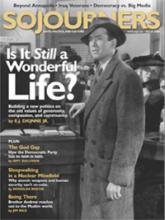For a very long time, I have believed that many of the old values that a new politics would seek to advance can be found in Frank Capra’s sturdy old Christmas movie It’s a Wonderful Life. Indeed I would make a large claim for this dear, schmaltzy movie: It tells politicians and religious leaders almost everything they need to know about how Americans think and feel about “moral values.” Watching it is a lot cheaper than paying for focus groups.
As I suspect many readers will know, It’s a Wonderful Life is the story of George Bailey, played by Jimmy Stewart. Bailey is a small-town guy desperate to leave and see the world. He never makes it. He stays in Bedford Falls and runs the family’s savings and loan while his brother wins glory in World War II. George marries his sweetheart and has a bunch of kids. Managing the S&L entails lending money to the town’s working people so they get to own their own tidy homes. In so doing, George faces down the town’s evil “big” banker, Mr. Potter, who doesn’t care a whit about working stiffs. At the end of the movie, George is close to killing himself when his bank is threatened with bankruptcy because his absent-minded uncle loses a deposit. His bank’s failure would give Mr. Potter a local monopoly.
Enter George’s guardian angel, Clarence. He shows George how much poorer the world would have been without him. George is convinced his life is wonderful. Call me a sap: I always get a tear in my eye at the closing scene, when George bursts into the Christmas celebration at his home, where all his neighbors have gathered to help him out of his jam.
Read the Full Article

